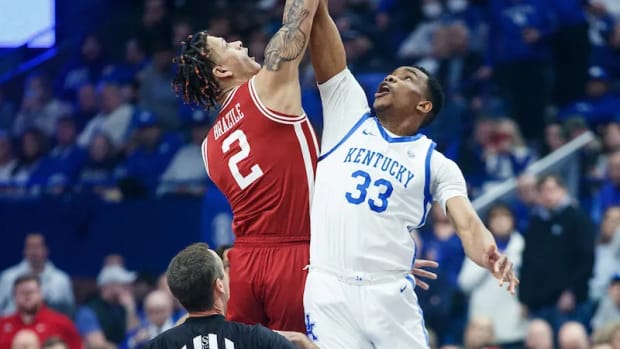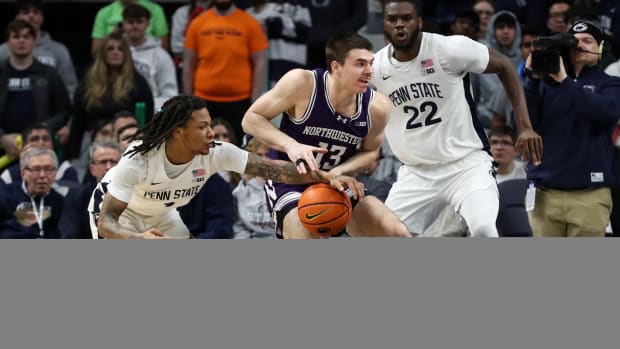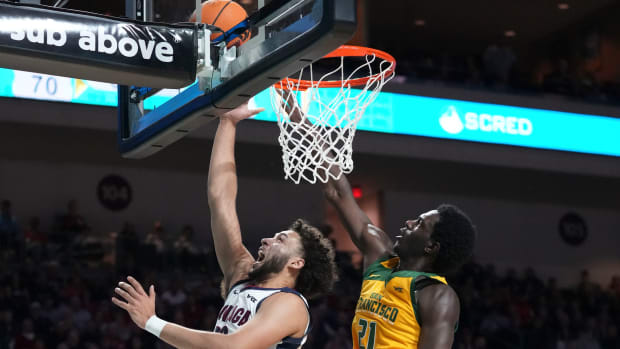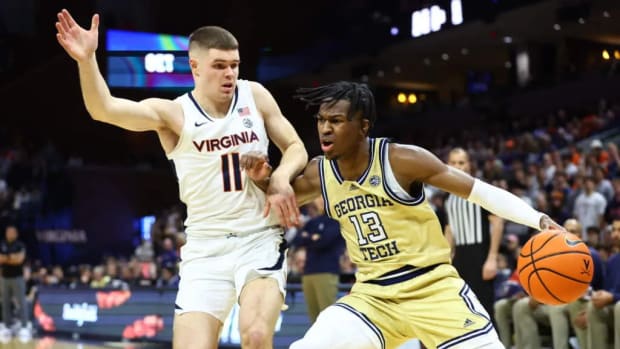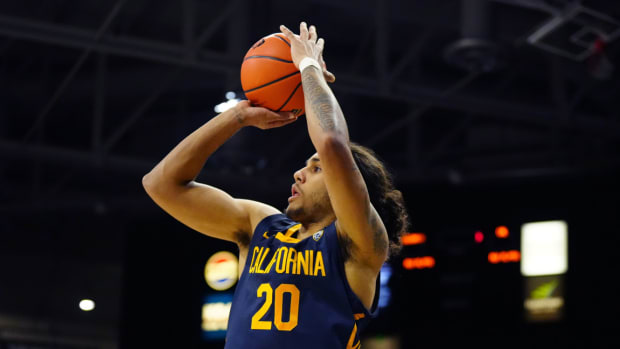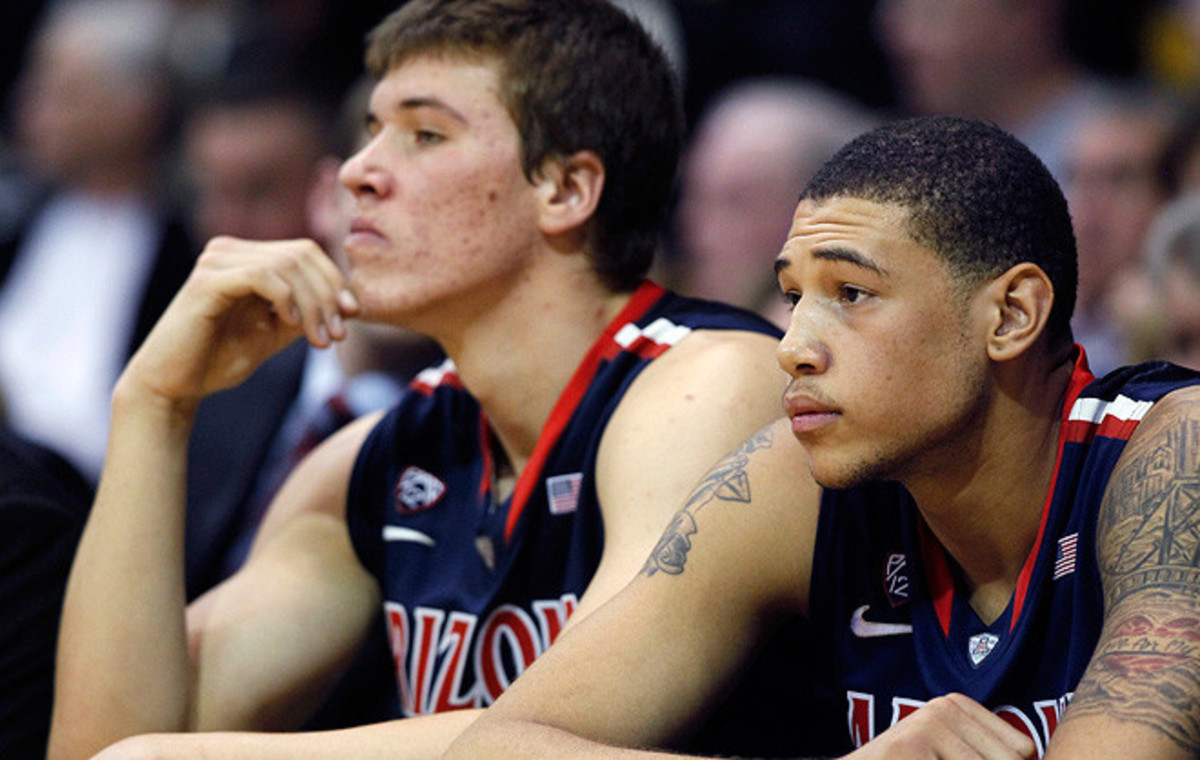
Loss to Colorado highlights serious issues plaguing Arizona
OV-ER-RA-TED! ... CLAP-CLAP-CLAPCLAPCLAP ... OV-ER-RAT-ED! ... CLAP-CLAP-CLAPCLAPCLAP
Based on current evidence, the Colorado kids aren't wrong, and something appears to be up with Arizona. What was a team with a rock-solid defense and productive-albeit-unspectacular offense through much of the season has started leaking at both ends of the floor. In Thursday's defeat, the execution struggles that have bubbled to the surfaced were compounded by a largely sluggish effort. Arizona never seemed to find any real rhythm, and afterward, they couldn't even get their stories straight.
Head coach Sean Miller: "We played hard. It wasn't as if I was yelling at our guys to play harder."
Senior forward Solomon Hill: "We just didn't pick it up today. They were the more aggressive team, start to finish."
Note: In press conference math, a player talking openly > a head coach spouting generic plaudits.
The debate on what exactly Arizona is has raged through much of the season. During their opportunistic 14-0 start to the campaign, the Wildcats were a solid team that also pulled a number of their high-profile showdowns out of the fire with late heroics (and, against Colorado, also perhaps with the help of a referee's judgment call). After that overtime win over the Buffaloes in the Pac-12 opener, the Wildcats were ranked as high as No. 3 in the nation, but they had used up at least three of their allotted lives.
Despite the protestations of some of their more vocal fans on Twitter at the time, both regression and the team's flaws were bound to catch up to them at some point and start evening things out. The Wildcats are operating without a real floor leader, relying on combo guards Mark Lyons and Nick Johnson to share the orchestration of the offense as well as a large share of the scoring. Many of Arizona's young frontcourt components remain more promising than productive, with none of Kaleb Tarczewski, Brandon Ashley or Angelo Chol (who had some bright moments in the first half) consistently supporting Hill as a secondary scorer. After the game, Miller labeled them as still "a work in progress."
"We're very young up front, and the better they get, no question the better our team is," he added.
Every team in the nation has shown weaknesses at times this season. The curious part with the Wildcats is they have started popping up at both ends of the floor, and not in a really consistent fashion. Thursday's loss was the fourth time in their last seven league games where the Wildcats' didn't manage to score even one point per possession (which is the overall Division I average). It was also the fifth time in league play where a defense that has locked most opponents down this season has allowed at least 1.05 points per possession. In this mini two-game skid, both Cal and Colorado have scorched them.
"I wish we would have played better overall," Miller said. "I'm worried about our defense, if I'm worried about anything, and that becomes the focus of moving forward, to try to get it back."
Near the end of his postgame session, Miller was asked what he thought this Arizona team was at this point. He replied, "20-4." Pushed about how he felt specifically about his team right now, he repeated "We're 20-4." And he has a valid point, one which he reinforced by noting the Wildcats' upcoming schedule. The college season is a long slog, with distinct parts and disjointing breaks, where practically every team runs into some level of adversity. In a couple of weeks, if the Wildcats can handle road tests at Utah and rejuvenated USC, they could be at 12-4 in the league heading to what could be a league-title determining showdown at UCLA. While two of Arizona's losses have come at home, they don't have a truly poor defeat all season.
So yes, things may not look great at the moment, but like everything else in this crazy season, it can change in a heartbeat. Whether a bounceback is fool's gold or a final transformation is to be determined, in part by whether the effort component of Thursday's defeat was also a short-term ill. Colorado deserves credit its defensive intensity and timely shot-making late in possessions, but Arizona was an enabler with a general lack of sharpness at both ends. Miller said afterward that he had gone to his bench more quickly to help offset the possible effects of Boulder's altitude, and Buffaloes head coach Tad Boyle agreed afterward that the altitude seemed to have affected the Wildcats a bit.
Whatever it was, despite Miller's protestations, Arizona looked disjointed and off its game. The team's passive capitulation in the game's final minute, out of timeouts and with no real interest in prolonging the inevitable, was the final punctuation. The Wildcats, like pretty much every team around the nation this season, aren't good enough to get away with what they showed against a good team in a tough road spot. Hill owned it afterward, and it will be up to the team's upperclass leaders to rectify it quickly, before these performance blips become a more defining trend heading into March.
"It's all effort. That's all it is," Hill said. "Our offense, I think, was pretty good. I think we could have got a couple more second-chance shots. But it's our effort. It's our defensive effort. It's not there. In order to get wins and be able to compete for the Pac-12 title, we have to have more effort."
